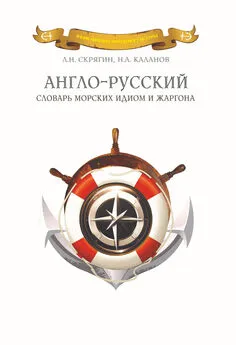Adam Makkai - Словарь американских идиом: 8000 единиц
- Название:Словарь американских идиом: 8000 единиц
- Автор:
- Жанр:
- Издательство:неизвестно
- Год:неизвестен
- ISBN:нет данных
- Рейтинг:
- Избранное:Добавить в избранное
-
Отзывы:
-
Ваша оценка:
Adam Makkai - Словарь американских идиом: 8000 единиц краткое содержание
Это обновленное и дополненное издание, содержащее более 8000 идиоматических
слов и выражений, причем каждое из которых снабжено грамматическим объяснением
и практическим примером. Словарь содержит лексемные идиомы, фразеологические
единицы и поговорки, имеющие особенное значение. В нем приведены наиболее
употребительные выражения только американского английского языка. Этот словарь — идеальное пособие для студентов, часто разъезжающих бизнесменов и просто
путешественников.
Словарь американских идиом: 8000 единиц - читать онлайн бесплатно полную версию (весь текст целиком)
Интервал:
Закладка:
[push around] {v.} , {informal} To be bossy with; bully. •/ Don’t try to push me around! / •/ Paul is always pushing the smaller children around. /
[push off]or [shove off] {v.} 1. To push a boat away from the shore. •/ Before Tom could reach the boat, Jake had shoved off. / 2. {slang} To start; leave. •/ We were ready to push off at ten o’clock, but had to wait for Jill. / •/ Jim was planning to stay at the beach all day, but when the crowds arrived he shoved off. /
[push on] {v. phr.} To press forward; proceed forward laboriously. •/ The exhausted mountain climbers pushed on, despite the rough weather, as the peak was already in sight. /
[push one’s luck]See: PRESS ONE’S LUCK.
[pushover] {n.} 1. Something easy to accomplish or overcome. •/ For Howard steering a boat is a pushover as he was raised on a tropical island. / 2. A person easily seduced. •/ It is rumored that she is a pushover when she has a bit to drink. /
[push over] {v. phr.} To upset; overthrow. •/ She is standing on her feet very solidly; a little criticism from you certainly won’t push her over. / •/ The wind in Chicago can be so strong that sometimes I’m afraid I’ll get pushed over. /
[push the panic button] {v. phr.} , {slang} To become very much frightened; nervous or excited, especially at a time of danger or worry. •/ John thought he saw a ghost and pushed the panic button. / •/ Keep cool; don’t hit the panic button! / Syn.: LOSE ONE’S HEAD.
[push-up] {n.} An exercise to build strong arms and shoulders, in which you lie on your stomach and push your body up on your hands and toes. •/ At the age of seventy, Grandpa still does twenty push-ups every day. / •/ The football team does push-ups every day. /
[push up daisies] {v. phr.} , {slang} To be dead and buried. •/ I’ll be around when you’re pushing up daisies. / •/ Don’t play with guns or you may push up the daisies. /
[put]See: HARD PUT or HARD PUT TO IT, STAY PUT.
[put about] {v. phr.} — Nautical usage. To turn in the opposite direction; turn around. •/ When we saw the storm clouds thickening in the sky, we put about quickly and raced ashore. /
[put a bee in one’s bonnet]See: BEE IN ONE’S BONNET.
[put a bug in one’s ear]or [put a flea in one’s ear]See: BUG IN ONE’S EAR.
[put across] {v.} 1. To explain clearly; make yourself understood; communicate. •/ He knew how to put his ideas across. / Compare: GET ACROSS. 2. {informal} To get (something) done successfully; bring to success; make real. •/ He put across a big sales campaign. / •/ The new librarian put across a fine new library building. / Syn.: PUT OVER(2). Compare: PULL OFF.
[put all one’s eggs in one basket] {v. phr.} To place all your efforts, interests, or hopes in a single person or thing. •/ Going steady in high school is putting all your eggs in one basket too soon. / •/ To buy stock in a single company is to put all your eggs in one basket. / •/ He has decided to specialize in lathe work, although he knows it is risky to put all his eggs in one basket. /
[put a new face on] {v. phr.} To alter the aspect of something; change. •/ Mr. Merry man’s announcement of his candidacy for governor puts an entirely new face on the political scene in our state. /
[put an end to]or [put a stop to] {v. phr.} 1. To make (something) end; stop; end. •/ The farmer built an electric fence around his field to put an end to trespassing. / •/ The principal said that running in the halls was dangerous, and told the teachers to put a stop to it. / 2. To destroy or kill. •/ The new highway took most of the traffic from the old road and put an end to Mr. Hanson’s motel business. / •/ When the horse broke his leg, the farmer put an end to him. /
[put aside] {v. phr.} 1. To save; put something aside for a special purpose. •/ Peter puts $100 aside every week. / 2. To let go of; put away. •/ The teacher to the students, "Put your books aside and start writing your tests!" /
[put away] {v.} 1. To put in the right place or out of sight. •/ She put away the towels. / 2. To lay aside; stop thinking about. •/ He put his worries away for the weekend. / 3. {informal} To eat or drink. •/ He put away a big supper and three cups of coffee. / Compare: STOW AWAY. 4. {informal} To put in a mental hospital. •/ He had to put his wife away when she became mentally ill. / 5. To put to death for a reason; kill. •/ He had his dog put away when it became too old and unhappy. /
[put back the clock]or [turn back the clock] {v. phr.} To go back in time; relive the past. •/ If I could put back the clock I’d give more thought to preparing for a career. / •/ Richard wishes that he had lived in frontier days, but he can’t turn back the clock. /
[put by] {v.} To save for the future; lay aside. •/ He had put by a good sum during a working lifetime. /
[putdown] {n.} An insult, •/ It was a nasty putdown when John called his sister a fat cow. /
[put down] {v. phr.} 1. To stop by force, crush. •/ In 24 hours the general had entirely put down the rebellion. / 2. To put a stop to; check. •/ She had patiently put down unkind talk by living a good life. / 3. To write a record of; write down. •/ He put down the story while it was fresh in his mind. / 4. To write a name in a list as agreeing to do something. •/ The banker put himself down for $1000. / •/ Sheila put Barbara down for the decorations. / 5. To decide the kind or class of; characterize. •/ He put the man down as a bum. / •/ He put it down as a piece of bad luck. / 6. To name as a cause; attribute. •/ He put the odd weather down to nuclear explosions. / 7. To dig; drill; sink. •/ He put down a new well. /
[put forth] {v. phr.} To produce; issue; send out. •/ In the spring the apple trees put forth beautiful white blossoms. / •/ The chairman of the board put forth an innovative proposal that was circulated by mail. /
[put ideas into one’s head] {v. phr.} To persuade someone to do something negative; put one up to something. •/ Billy would never have poured glue into his father’s shoes if the neighbor’s son hadn’t been putting ideas into his head. /
[put in] {v.} 1. To add to what has been said; say (something) in addition to what others say. •/ While the boys were discussing the car accident, Ben put in that the road was icy. / •/ My father put in a word for me and I got the job. / 2. To buy and keep in a store to sell. •/ He put in a full stock of drugs. / 3. To spend (time). •/ He put in many years as a printer. / •/ He put in an hour a day reading. / 4. To plant. •/ He put in a row of radishes. / 5. To stop at a port on a journey by water. •/ After the fire, the ship put in for repairs. / 6. To apply; ask. — Used with "for". •/ When a better job was open, he put in for it. / •/ The sailor put in for time to visit his family before the ship went to sea. /
[put in a word for] {v. phr.} To speak in favor of someone; recommend someone. •/ "Don’t worry about your job application," Sam said to Tim. "I’ll put in a word for you with the selection committee." /
[put in an appearance]also [make an appearance] {v. phr.} To be present, esp. for a short time; visit; appear. •/ He put in an appearance at work, but he was too ill to stay. / •/ The president put in an appearance at several dances the evening after he was sworn in. /
[put in mind of] {v. phr.} , {nonstandard} To remind of; suggest to; call up the memory of. •/ She puts me in mind of my sister. / •/ That puts me in mind of a story. /
[put in one’s place] {v. phr.} , {informal} To criticize someone for impolite boldness; remind someone of low rank or position; reduce someone’s unsuitable pride; deflate. •/ The assistant was trying to take command when the professor put him in his place by saying, "No, I’m the boss here." / •/ She was a teacher who could put a troublemaker in his place with just a glance. / Syn.: CUT DOWN TO SIZE.
[put in one’s two cents worth]See: TWO CENTS(2).
[put in one’s way]See: PUT IN THE WAY OF.
[put in the way of]or [put in one’s way] {v. phr.} To set before (someone); give to (someone); show the way to; help toward. •/ After Joe graduated, the coach put him in the way of a good job. / •/ The librarian put me in the way of a lot of new material on the subject of my report. /
[put (it) in black and white]See: BLACK AND WHITE.
[put (it) in writing]See: BLACK AND WHITE.
[put it on thick]See: LAY IT ON.
[put off] {v.} 1. {informal} To cause confusion in; embarrass; displease. •/ I was rather put off by the shamelessness of his proposal. / •/ The man’s slovenliness put me off. / 2. To wait and have (something) at a later time; postpone. •/ They put off the picnic because of the rain. / 3. To make (someone) wait; turn aside. •/ When he asked her to name a day for their wedding, she put him off. / •/ When the bill collector called, Mrs. Smith managed to put him off. / 4. To draw away the attention; turn aside; distract. •/ Little Jeannie began to tell the guests some family secrets, but Father was able to put her off. / 5. To move out to sea; leave shore. •/ They put off in small boats to meet the coming ship. / Syn.: PUT OUT.
[put on] {v. phr.} 1. To dress in. •/ The boy took off his clothes and put on his pajamas. / •/ Mother put a coat on the baby. / 2a. To pretend; assume; show. •/ Mary isn’t really sick; she’s only putting on. / •/ He put on a smile. / •/ The child was putting on airs. / 2b. To exaggerate; make too much of. •/ That’s rather putting it on. / Compare: LAY IT ON. 3. To begin to have more (body weight); gain (weight). •/ Mary was thin from sickness, and the doctor said she must put on ten pounds. / •/ Too many sweets and not enough exercise will make you put on weight. / 4a. To plan and prepare; produce; arrange; give; stage. •/ The senior class put on a dance. / •/ The actor put on a fine performance. / 4b. To make (an effort). •/ The runner put on an extra burst of speed and won the race. / 5. To choose to send; employ on a job. •/ The school put on extra men to get the new building ready. /
Читать дальшеИнтервал:
Закладка:







